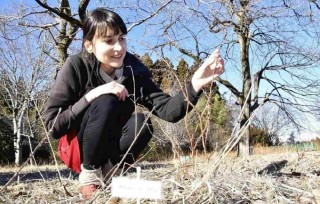Loading
Search
▼ French Illustrator Starts Farm to Bring Tourists to Fukushima
- Category:Tourism
French illustrator Emilie Bouquet-Nanko wants to experience Japanese farm life, and in doing so, help revitalize a town in Fukushima Prefecture hit hard by the 2011 disaster.
Bouquet-Nanko, 34, was to make a move Saturday from Iwaki in the prefecture to Okuma, one of the towns devastated by the accident at the Fukushima No. 1 nuclear power plant, in order to take up farming.
She has leased about 1.7 hectares of farmland that has sat unused since the nuclear accident, and will grow berries and other crops with an eye to developing it into a tourist attraction.
“I want to dispel the image of the nuclear accident and create a lively atmosphere in the town,” she said.
Having some Japanese acquaintances, Bouquet-Nanko visited Japan several times as a tourist.
In April 2011, she began living in Tokyo and worked mainly as a French language teacher. She married a Japanese man.
In 2018, she made her first visit to Fukushima Prefecture on the recommendation of a student, who is a native of Fukushima City.
“At the time, Fukushima only evoked a dangerous image for me from the nuclear accident,” she recalled.
However, she was immediately captivated by the beautiful landscape and the warmth of the people in the prefecture. “The abundance of nature makes me feel comfortable. This is where I belong,” she thought.
In 2021, she moved to Iwaki.
Born and raised in the French countryside, Bouquet-Nanko has had a green thumb since childhood. After visiting Fukushima Prefecture, her eagerness to get back to the soil grew. She said she chose Okuma because the town has beautiful scenery, which she will never get bored of.
Her initiative could also become “an opportunity to make people rethink the negative image that the town has from the nuclear accident,” she added.
Bouquet-Nanko spent six months preparing a business plan and financial charts, while checking Japanese terms to create the necessary documents.
In December last year, she presented her farm concept to the municipal government and was then shown a plot of farmland in an area where an evacuation order had been lifted.
Currently, Bouquet-Nanko is learning cultivation techniques from farmers with whom she is acquainted, and is planting saplings. Her Okuma plans begin with clearing the rough fields and installing a fence to protect crops from animals.
Bouquet-Nanko plans for a first harvest as early as this summer. Along with berries, she also intends to grow herbs, tomatoes and other vegetables, and eventually make her farm a tourist attraction where visitors can experience agricultural work and other activities.
“I want to create a place where parents and children can enjoy the scenery of the communal forests and mountains, while picking berries,” she said.
Bouquet-Nanko plans to share her new farm life with people around the world on social media.
“The charms of Fukushima have yet to be well-known overseas. I want to help people learn about the current state of its reconstruction,” she said.
Bouquet-Nanko, 34, was to make a move Saturday from Iwaki in the prefecture to Okuma, one of the towns devastated by the accident at the Fukushima No. 1 nuclear power plant, in order to take up farming.
She has leased about 1.7 hectares of farmland that has sat unused since the nuclear accident, and will grow berries and other crops with an eye to developing it into a tourist attraction.
“I want to dispel the image of the nuclear accident and create a lively atmosphere in the town,” she said.
Having some Japanese acquaintances, Bouquet-Nanko visited Japan several times as a tourist.
In April 2011, she began living in Tokyo and worked mainly as a French language teacher. She married a Japanese man.
In 2018, she made her first visit to Fukushima Prefecture on the recommendation of a student, who is a native of Fukushima City.
“At the time, Fukushima only evoked a dangerous image for me from the nuclear accident,” she recalled.
However, she was immediately captivated by the beautiful landscape and the warmth of the people in the prefecture. “The abundance of nature makes me feel comfortable. This is where I belong,” she thought.
In 2021, she moved to Iwaki.
Born and raised in the French countryside, Bouquet-Nanko has had a green thumb since childhood. After visiting Fukushima Prefecture, her eagerness to get back to the soil grew. She said she chose Okuma because the town has beautiful scenery, which she will never get bored of.
Her initiative could also become “an opportunity to make people rethink the negative image that the town has from the nuclear accident,” she added.
Bouquet-Nanko spent six months preparing a business plan and financial charts, while checking Japanese terms to create the necessary documents.
In December last year, she presented her farm concept to the municipal government and was then shown a plot of farmland in an area where an evacuation order had been lifted.
Currently, Bouquet-Nanko is learning cultivation techniques from farmers with whom she is acquainted, and is planting saplings. Her Okuma plans begin with clearing the rough fields and installing a fence to protect crops from animals.
Bouquet-Nanko plans for a first harvest as early as this summer. Along with berries, she also intends to grow herbs, tomatoes and other vegetables, and eventually make her farm a tourist attraction where visitors can experience agricultural work and other activities.
“I want to create a place where parents and children can enjoy the scenery of the communal forests and mountains, while picking berries,” she said.
Bouquet-Nanko plans to share her new farm life with people around the world on social media.
“The charms of Fukushima have yet to be well-known overseas. I want to help people learn about the current state of its reconstruction,” she said.
- February 20, 2023
- Comment (0)
- Trackback(0)


